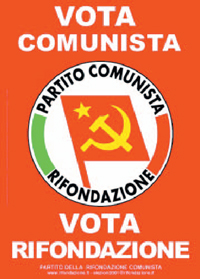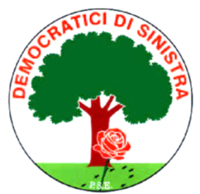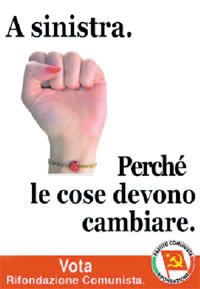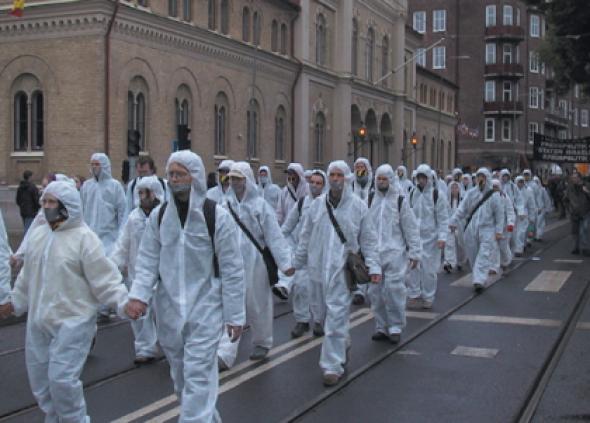European Social Forum
In anticipation of the European Social Forum – which will have taken place by the time this issue of Mute comes out – JJ King unravels the political and structural genealogies of organisers and participants as they align with more and less statist forms.
‘There are [...] two primary positions in the response to today’s dominant forces of globalization: either one can work to reinforce the sovereignty of nation-states as a defensive barrier against the control of foreign and global capital, or one can strive towards a non-national alternative to the present form of globalization that is equally global.’[1] (Michael Hardt.)
‘When people talk about a “crisis of politics”, they are effectively saying that the democratic State no longer functions– and that in fact it has become irreversibly corrupt in all its principles and organs[...] There has been talk of an “end of history,” and if such a thing exists we might certainly identify it in the end of the constitutional dialectic to which liberalism and the mature capitalist State have tied us.’[2] (Antonio Negri.)
From the 6th to the 10th of November 2002, the European Social Forum (ESF) will take place in Florence, Italy. This meeting of activists, NGOs and political groups follows the second World Social Forum (WSF)[3] which took place in Porto Alegre, Brazil during February last year and was attended by between 50,000 and 70,000 people.
Discussions at Porto Alegre centred largely around organisation against destructive corporate practice, ‘Third World’ debt, and the general problem of global neo-liberal economic policy. But many regarded the way in which discussions were framed as suffering from a preponderance of party-political and state-centric interests amongst the WSF’s organisers, particularly the PT (Workers’ Party of Brazil, who used the WSF as a stage for their election campaign), ATTAC (with its close links to French politicians, notably Jean-Pierre Chevènement, who advocate strengthening national sovereignty as a solution to the problems of contemporary globalisation), Le Monde Diplomatique, and the Association of Brazilian Businessmen for Citizens. A wide range of WSF panels were composed of European politicians, legislators and NGO representatives, including ministers from France, Belgium and Portugal who had only recently voted to support the attacks on Afghanistan and the present ‘War on Terror’.
This decoration of the Social Forum by the Centre- Left politicians smacked to some of an opportunist polishing of progressive credentials (three of the official French delegates, for example, were running for presidency at the time), and was vehemently protested by members of anti-capitalist groups like MRG Catalunya-International, inspired by the People’s Global Action (PGA)[4], as well as 600 attendees of the alternative Jornadas Anarquistas – ‘Anarchist Journeys’ – who occupied a three storey house in order to emphasise that, as one IMC (Independent Media Centre) poster put it, ‘Porto Alegre isn’t the social democratic paradise that the PT makes it out to be.’ By way of confirmation of this position, later IMC posts reported that local police, under the command of the PT and dressed in full riot gear, quickly surrounded the house, nearly running over one squatter in their attempts to clear it.
Undoubtedly the question of whether the state should properly be involved in resistance to neoliberalism is one yet to be answered by many interested in limiting the patent depredations of capitalism. But the occupation of the most visible and dominant spaces of the Porto Alegre Forum by sovereigntist perspectives, and the accompanying disenfranchisement of the non-sovereigntist, horizontally organised political formations that make up the bedrock of today’s anti-capital movement, quite simply prevented this question from being properly framed, let alone answered, there.
The commitment to multilateral, diverse organisation expressed in Porto Alegre’s Call of the Social Movements[5], is important in this respect. Proposals made at Porto Alegre that 2002’s European Social Forum organise itself as an ‘open meeting space for in-depth reflection, democratic debate of ideas, formulation of proposals, free exchange of experiences and planning of effective action among entities and movements of civil society’[6] might be seen as answering, however weakly, the charges of statist/sovereigntist bias in the organisation of the WSF. Yet hopes that a proper dialogue between the two positions could take place within the ESF have been disappointed, as the terms of the ESF’s organisation have once again presented themselves as problematic to many groups on precisely the same grounds as that of the WSF.
The ESF’s organisation has been formulated largely by a co-operation between the Disobedienti (or ‘Civil Disobedience’, formerly known as the Tute Bianche / White Overalls), spearheaded by Antonio Negri, led by Luca Casarini and based in North East Italy, and the Rifondazione Comunista (RC), a national far-left group which splintered from the previously encumbent centre-left party Democratici di Sinistra (DS), and which sits in Italian Parliament with roughly 6% of the national vote. Some regard this alliance between the statist-leftist RC, who have made it their open aim to ‘contaminate, and be contaminated by’ the anti-capitalist movement, and the ‘Zapatist’ Disobedienti to be rather an unholy one, especially since it has effectively bought the Blairite DS a direct role in the ESF’s organisation.
 The Forum’s location in Florence, locally ruled by the DS party, is not insignificant in this respect. The resources the DS are able to offer here – a conference centre, accommodation, satellite uplinks, and so on – are obviously attractive to the Disobedienti/RC. Obversely, by cooperating with the Disobedienti and providing access to its own tax-funded, party-political infrastructure and that of the DS, the Leninist RC is able to promote itself as being ‘side by side’ with active ‘non-statist’ anti-capitalist groups. And as at Porto Alegre, the organising Disobedienti/Democratici di Sinistra/Rifondazione Comunista nexus has undoubtedly been able to allocate time, at the ESF, to groups that fit within the more traditional statist framework, with NGOs such as ATTAC once again looming large. Indeed, the ESF is beginning to look like a straightforward progression from Porto Alegre, a replay of the flocking of extra-parliamentary groups to a local arm of a statist power, this time in the shape of the Democratici della Sinistra rather than the Workers’ Party of Brazil.
The Forum’s location in Florence, locally ruled by the DS party, is not insignificant in this respect. The resources the DS are able to offer here – a conference centre, accommodation, satellite uplinks, and so on – are obviously attractive to the Disobedienti/RC. Obversely, by cooperating with the Disobedienti and providing access to its own tax-funded, party-political infrastructure and that of the DS, the Leninist RC is able to promote itself as being ‘side by side’ with active ‘non-statist’ anti-capitalist groups. And as at Porto Alegre, the organising Disobedienti/Democratici di Sinistra/Rifondazione Comunista nexus has undoubtedly been able to allocate time, at the ESF, to groups that fit within the more traditional statist framework, with NGOs such as ATTAC once again looming large. Indeed, the ESF is beginning to look like a straightforward progression from Porto Alegre, a replay of the flocking of extra-parliamentary groups to a local arm of a statist power, this time in the shape of the Democratici della Sinistra rather than the Workers’ Party of Brazil.
 What is now being articulated in the weeks running up to the ESF is that this process of alliance-building, underway in Italy since the Genoa Social Forum and the 2001 G8 summit and recently derided by the journal DeriveApprodi in its ‘Open letter to the European movements’[7], must not be allowed to bring the project of articulating non-state modes of resistance and alternatives to capitalism to a standstill. Many feel that the uncomfortable alliance between the highly heterogeneous elements organising the ESF, each with their very different histories and political cultures, will once again distort the discussions that urgently need to take place in Florence. It is in this context that calls for a new plan for Florence have found voice, one which more closely follows the principles laid out in Porto Alegre’s ‘Call of the Social Movements’. People’s Global Action, unwilling to turn its back completely on the ESF, which, after all, will be a moment of strong visibility in Europe, has been discussing at its recent European meetings producing a parallel space characterised by ‘decentralized, horizontal, assembly- based, and anti-authoritarian’ principles – the same principles through which PGA itself is supposed to be constituted – ‘a space that would maintain its autonomy with respect to the “official” space of the ESF, but at the same time remain connected, allowing for [...] intervention.’[8] The idea is that this space would have ‘one leg outside and another inside’ the ESF, and that its participation in the ESF would take place through interventions in the context of thematic proposals in the official program, the incorporation of new issues, and discussion of the ESF itself as a political and organisational model.
What is now being articulated in the weeks running up to the ESF is that this process of alliance-building, underway in Italy since the Genoa Social Forum and the 2001 G8 summit and recently derided by the journal DeriveApprodi in its ‘Open letter to the European movements’[7], must not be allowed to bring the project of articulating non-state modes of resistance and alternatives to capitalism to a standstill. Many feel that the uncomfortable alliance between the highly heterogeneous elements organising the ESF, each with their very different histories and political cultures, will once again distort the discussions that urgently need to take place in Florence. It is in this context that calls for a new plan for Florence have found voice, one which more closely follows the principles laid out in Porto Alegre’s ‘Call of the Social Movements’. People’s Global Action, unwilling to turn its back completely on the ESF, which, after all, will be a moment of strong visibility in Europe, has been discussing at its recent European meetings producing a parallel space characterised by ‘decentralized, horizontal, assembly- based, and anti-authoritarian’ principles – the same principles through which PGA itself is supposed to be constituted – ‘a space that would maintain its autonomy with respect to the “official” space of the ESF, but at the same time remain connected, allowing for [...] intervention.’[8] The idea is that this space would have ‘one leg outside and another inside’ the ESF, and that its participation in the ESF would take place through interventions in the context of thematic proposals in the official program, the incorporation of new issues, and discussion of the ESF itself as a political and organisational model.
 PGA’s plan, in a slightly different form, has now been taken up by a diverse collection of groups under the banner of ‘Euroaction Hub’, ‘a place of crossover cooperation where common projects can develop [...] bartering practices and ideas, sharing transnational horizontal networks, affirming new social and communication rights, reclaiming public spaces on the net and the city [and] agitating for new conflicts across constituent Europe.’[9] The content areas proposed for the Euroaction Hub will probably be less constitutive of the meetings here than the ‘infrastructural’, representational, processual and organisational issues that are becoming critical to the movement as a whole. One of the reasons for the movement’s effective political invisibility at the WSF is that traditional ‘centralised’ organisations have spokespeople who represent them and can be recognised; networks do not. The movement must solve the question of how to ‘represent the unrepresentable’ to prevent future WSFs from occurring. The questions of knowledge sharing, community decision making, possible infrastructures for many-to-many and peer-to-peer communications, and the status of free circulation of information against privacy and security are critical in this respect, for it seems likely that the movement will have to pose open, distributed, multitudinous political involvement against the undoubted exploitation of spectacular representality at events like the ESF. Rather fishy in all of this is the intent of the Disobedienti, whose position in the sovereigntist/nonsovereigntist divide has become increasingly duplicitous over the last months. On the one hand, the group is patently working with the statist RC, perhaps thinking to achieve popular ‘legitimacy’ after the accusations of troublemaking levelled at it post-Genoa. Such a strategy, apparently unlikely for a group whose resident autodidact Tony Negri has, along with other members of the Autonomia, consistently derided state power (see the quote above), makes sense in the context of the Disobedienti’s own recent entry into local state politics.[10] At the ESF, the Disobedienti have seized the chance to appear as ranking organisers, the ‘movement’ representatives alongside the Trots and Leninists. But simultaneously, their representatives have appeared at PGA meetings agreeing spiritedly with the problems of the ESF’s organisation – the organisation they are actively part of – and the need for an alternative forum. Such political manoeuvrings, which seem to have done much to bring the Forum into clammy proximity with a centre left party positioning for re-election, further evidence the relevance of the discussions and investigations into disclosure and information-sharing at the Euroaction Hub. Indeed, those discussions are necessary at every level, both to fight the emergence of the cryptohierarchies that are troubling the movement in a variety of contexts, and to begin to find ways of creating a public decision-making structure that can truly enact the distributed will of the multitude that Negri once spoke of so optimistically. Each and every person still interested in such a process should bring themselves and their ideas to the Euroaction Hub space during European Social Forum or visit their website.[11]
PGA’s plan, in a slightly different form, has now been taken up by a diverse collection of groups under the banner of ‘Euroaction Hub’, ‘a place of crossover cooperation where common projects can develop [...] bartering practices and ideas, sharing transnational horizontal networks, affirming new social and communication rights, reclaiming public spaces on the net and the city [and] agitating for new conflicts across constituent Europe.’[9] The content areas proposed for the Euroaction Hub will probably be less constitutive of the meetings here than the ‘infrastructural’, representational, processual and organisational issues that are becoming critical to the movement as a whole. One of the reasons for the movement’s effective political invisibility at the WSF is that traditional ‘centralised’ organisations have spokespeople who represent them and can be recognised; networks do not. The movement must solve the question of how to ‘represent the unrepresentable’ to prevent future WSFs from occurring. The questions of knowledge sharing, community decision making, possible infrastructures for many-to-many and peer-to-peer communications, and the status of free circulation of information against privacy and security are critical in this respect, for it seems likely that the movement will have to pose open, distributed, multitudinous political involvement against the undoubted exploitation of spectacular representality at events like the ESF. Rather fishy in all of this is the intent of the Disobedienti, whose position in the sovereigntist/nonsovereigntist divide has become increasingly duplicitous over the last months. On the one hand, the group is patently working with the statist RC, perhaps thinking to achieve popular ‘legitimacy’ after the accusations of troublemaking levelled at it post-Genoa. Such a strategy, apparently unlikely for a group whose resident autodidact Tony Negri has, along with other members of the Autonomia, consistently derided state power (see the quote above), makes sense in the context of the Disobedienti’s own recent entry into local state politics.[10] At the ESF, the Disobedienti have seized the chance to appear as ranking organisers, the ‘movement’ representatives alongside the Trots and Leninists. But simultaneously, their representatives have appeared at PGA meetings agreeing spiritedly with the problems of the ESF’s organisation – the organisation they are actively part of – and the need for an alternative forum. Such political manoeuvrings, which seem to have done much to bring the Forum into clammy proximity with a centre left party positioning for re-election, further evidence the relevance of the discussions and investigations into disclosure and information-sharing at the Euroaction Hub. Indeed, those discussions are necessary at every level, both to fight the emergence of the cryptohierarchies that are troubling the movement in a variety of contexts, and to begin to find ways of creating a public decision-making structure that can truly enact the distributed will of the multitude that Negri once spoke of so optimistically. Each and every person still interested in such a process should bring themselves and their ideas to the Euroaction Hub space during European Social Forum or visit their website.[11]
[1] Michael Hardt, ‘Porto Alegre: Today’s Bandung?’ in Alt.media, republished on Ainfos [http://www.ainfos.ca/02/jul/ainfos00560.html]
[2] Antonio Negri, ‘Constituent Republic’, in Paolo Virno and Michael Hardt, Eds., Radical Thought in Italy, A Potential Politics (Minn., University of Minnesota, 1996), pp. 213-222, p. 214
[3] See [http://www.forumsocialmundial.org.br]
[4] See [http://www.agp.org] for a description of the PGA and its hallmarks
[5] Available at, for example [http://www.mediasol.org/xarticle.php3?id_article=1448]
[6] From the ESF website: [http://www.fse-esf.org]
[7] Available at [http://www.deriveapprodi.org/edit-engl.htm]
[8] See, for example, the PGA discussion document at [http://lists.myspinach.org/arch ives/pga-pacifika/2002-August/000063.html]
[9] See [http://www.fseesf.org/article.php3?id_article=171]. This document was only available in Italian at the time of writing
[10] This has taken place through the standing of Italian Social Forums (which equal, practically, Disobedienti, RC, progressive leftist Catholics and occupied social centers) in which the Rifondazione Comunista and the Disobedienti are actively cooperating: recognition by the parliamentarian RC may be an attempt to gain leverage there – crucially for the Disobedienti, who have not been doing terribly well in such elections to date
[11] In order to become part of the formation of this alternative discursive space, see the Eur@ction Hub plan at [http://hubproject.org/]
JJ King <jamie AT metamute.com> is a contributing editor of Mute magazine. His PhD thesis, The Cultural Construction of Cyberspace, is available at [http://www.jamie.com/thesis/thesis.pdf]
Mute Books Orders
For Mute Books distribution contact Anagram Books
contact@anagrambooks.com
For online purchases visit anagrambooks.com








